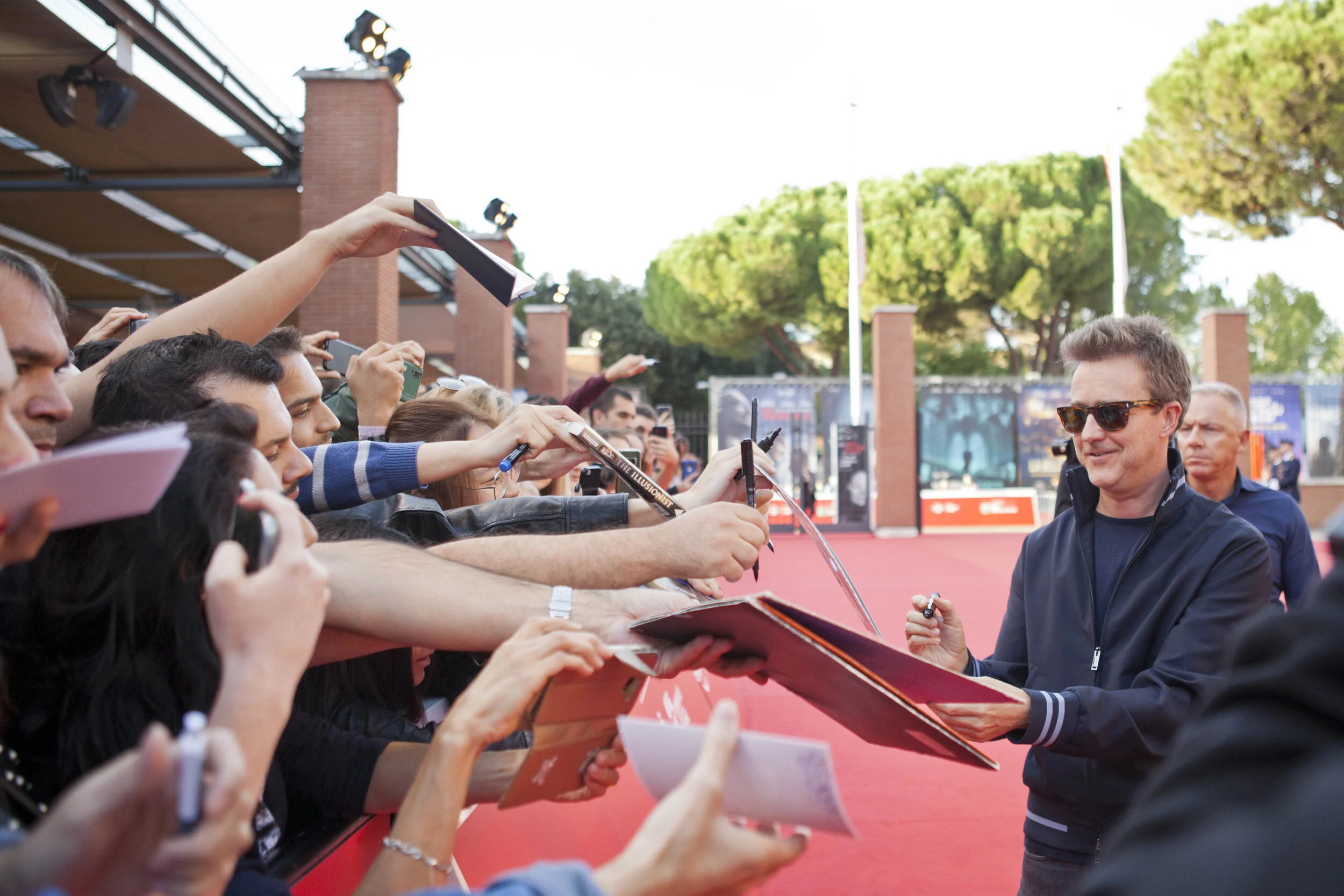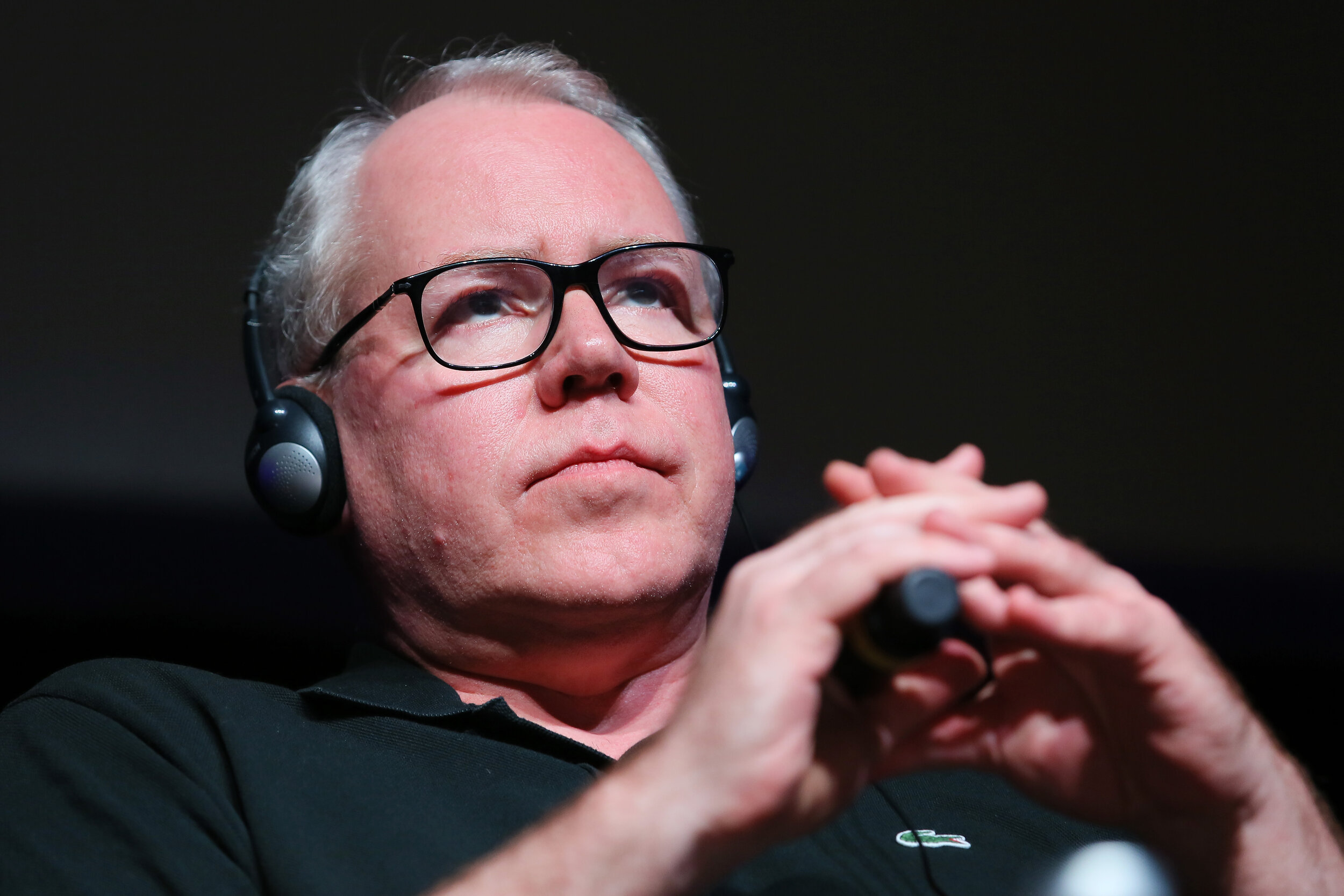There were films, fashion and public conversations with cinema celebrities. But beyond the red carpets, this year's Festa del cinema di Roma proved a meeting point for understanding the world around us, and sharing thoughts with like-minded people from faraway lands. Here is my personal diary of a wonderful event held in one of the most beautiful cities in the world.
What has struck me about this year's Rome Film Festival -- which wrapped up this past Sunday -- is how much it actually felt like a great big party that the general audience was invited to. In fact, the name of the event in Italian -- Festa del cinema di Roma -- literally translates to "Rome's cinema party". All around the Auditorium Parco della Musica there were kids awaiting their favorite cartoon characters to walk down the red carpet, young adults who patiently and politely stood in long lines to be able to hear their beloved celebrities speak, and older adults sitting entranced while watching the latest works by Ed Norton, Martin Scorsese, Nicolas Bedos and Ron Howard. To name a few of course.
It was a magical way for this somewhat disillusioned, of late, film writer to reconnect with the passion I once felt for cinema.
Starting with the opening film 'Motherless Brooklyn', directed, co-written and starring Edward Norton, I immediately felt a jolt of inspiration. The film itself is a wonderful homage to the noirs of the past, but also to the city of New York, and being that I also recently reconnected with the Big Apple myself, it was for me the perfect film to watch, to kick it all off in style.
Festa del Cinema di Roma 2019 - Red Carpet Edward Norton | foto Luca Dammicco / Fondazione Cinema per Roma
Norton also held a conversation with the public, where he talked about his love for the theater and feeling like a "rockstar" on stage. But he also tackled how Spike Lee has changed the landscape of American cinema and touched briefly, but importantly, on the problem with reading "sound byte headlines" the kind that clickbait us into reading a whole lot of fake news. It was a fascinating afternoon spent in the company of an acting -- and directing -- heavyweight.
From Ed Norton I learned about professionalism and inner elegance, the kind Honoré de Balzac meant when he wrote "A man becomes wealthy; he is born elegant."
ROME, ITALY - OCTOBER 19: (L-R) Frances McDormand, Bill Murray, Wes Anderson and Edward Norton walk a red carpet during the 14th Rome Film Festival on October 19, 2019 in Rome, Italy. (Photo by Vittorio Zunino Celotto/Getty Images for RFF)
Then it was time for the unequaled Bill Murray, who was being bestowed with a Lifetime Achievement award at Rome Film Fest. To present it to him was none other than Wes Anderson and in typically absurd Wes Anderson style, the event was well... Eventful!
From the cancelled 1 p.m. press conference because, to quote Antonio Monda the artistic director of Rome FF, "Bill Murray is still in his pajamas," to the untranslated encounter with the public, which left Italian-only speaking spectators who had paid good money for their tickets enraged, it was an afternoon to be remembered. I knew I wanted to leave it to my colleagues, as I've had my own strange encounters with both Anderson and Murray. The former couldn't be bothered to contribute a quote to a Vogue Italia piece I was writing (and betting my career on!) a couple of years ago. The latter was super fun to interview in Berlin, eccentric and all, yet once I went to transcribe our chat, there was little that could be used, besides one alright quote about how he walked off the set with his Speedo trunks from Anderson's 2004 film 'The Life Aquatic of Steve Zissou'.
From both Bill Murray and Wes Anderson I learned that although I may adore someone as an artist, I can also give myself permission to dislike them as human beings and that could be due to a simple lack of chemistry with them. Not anyone's fault... I also learned that the Italian media wouldn't blame Murray and Anderson for their bad behavior, as I did, but ended up somehow making it Monda's issue. And the artistic director responded in due tone to their complaints.
ROME, ITALY - OCTOBER 20: Bret Easton Ellis attends the press conference during the 14th Rome Film Festival on October 20, 2019 in Rome, Italy. (Photo by Ernesto S. Ruscio/Getty Images for RFF)
A few films later, it was time to hear novelist Bret Easton Ellis talk about cinema, 80's pop culture vs. the present cancel culture and his latest book 'White'. All his life Ellis has been the poster child for political incorrectness, in the sense that he did it all too young, too fast and too public. Yet for me, growing up during the same time, he provided a blueprint for how to risk just a little bit more, push the boundaries just a bit further in both my writing and my life.
From Bret Easton Ellis I learned, once again, that speaking my mind and not apologizing for doing so is the way to go.
I had long craved to watch Oualid Mouaness' '1982', a film about the last day of a little boy at his school just outside Beirut, on the eve of the Israeli invasion of Lebanon. Mouaness is a friend, his film has been on my radar since meeting him in Doha during their Qumra event two years ago, and Arab cinema, in particular Lebanese films really excite me. If we are to ever stop thinking of the Arab world as "the Others" we need to learn about their infinite culture and wondrous humanity through their fascinating cinema. I wasn't disappointed when I finally watched '1982' in Rome.
In fact, I reconnected with my inner child through Oualid Mouaness and his work and discovered a newfound joy in watching cinema. Really great cinema. And that was my lesson from '1982'.
Then it was time for Martin Scorsese and his Netflix title 'The Irishman' which he came to present himself at the Rome Film Festival. The echo from his comments about Marvel films followed Scorsese to Rome, but in typical #MeToo era fashion, so did the idea that his films don't feature enough women leads. “That’s not even a valid point,” Scorsese shut down the idea. “It’s a question I’ve had for so many years. It is a waste of everybody’s time.” Truth. I mean have we forgotten 'Alice Doesn't Live Here Anymore' and 'The Age of Innocence'? “They don’t count [those movies],” Scorsese added and “if a story calls for a female lead” it will be featured there. Read Filmuforia's review of 'The Irishman' here.
ROME, ITALY - OCTOBER 21: Martin Scorsese attends the press conference of the movie "The Irishman" during the 14th Rome Film Festival on October 21, 2019 in Rome, Italy. (Photo by Ernesto S. Ruscio/Getty Images for RFF)
From Martin Scorsese I learned that I often don't like the tactics of my fellow journalists in getting a scoop. I would rather explore the humanity in cinema and art. I'll leave catchy headlines to others... They make everything seem too National Enquirer for me.
Then after a morning spent in the company of Alexandre de La Patellière's and Matthieu Delaporte's touching, laugh through your tears 'Le Meilleur reste à venir' which translates to 'The Best is Yet to Come' -- which I urge everyone to watch! -- it was time for more French wisdom. I hold a special place in my heart for French filmmaker Olivier Assayas, in part because I've always loved that name -- "Olivier" -- but also because he once used to write about cinema. And thus both understands what makes a great interview and doesn't look down on fellow film critics and writers. I found a new reason to admire him, who spoke perfect English with me in Locarno when I interviewed him three years ago, and happened to be fluent in Italian as well, addressing his public and journalists in our language while in Rome.
ROME, ITALY - OCTOBER 24: Director Olivier Assayas attends the red carpet during the 14th Rome Film Festival on October 24, 2019 in Rome, Italy. (Photo by Ernesto S. Ruscio/Getty Images for RFF)
What I learned from Oliver Assayas, as well as the gentlemen behind 'The Best is Yet to Come' is modesty, because as wondrous as their films are, they don't need to put on airs to convey just how important they are to this world. Their work and talent speak for them.
I'd also like to talk briefly about 'Judy' a really wondrous, beautiful film about the loneliness of being a celebrity. Renée Zellweger will definitely get an Oscar for her performance as Judy Garland and the film has really stayed with me throughout the last week.
There was also John Travolta, accepting an acting prize for his role in 'The Fanatic' a film which deals with fan-hood and the perils of being in the public eye. While in Rome Travolta was classy and kind, asking to see those who asked him questions and addressing them as human beings. Yes, something unheard of in the industry, addressing people as human beings. I learned from John Travolta that I surprised myself at being surprised by that statement. And I also learned that kindness does go a long way in life.
Festa del Cinema di Roma 2019 - Convegno Costume Designer Panel
Other little lessons were sprinkled here and there. There was quite a lot of fashion at this year's Rome Film Festival and I don't mean simply on the red carpet. A seminar presented with the support of Swarovski, co produced by the Academy of Motion Picture Arts and Sciences and Rome Film Fest, in collaboration with ASC and Istituto Luce Cinecittà featuring Italian costume designers Daniela Ciancio, Eva Coen, Stefano de Nardis, Gabriella Pescucci, and Carlo Poggioli, all introduced by Deborah Nadoolman Landis. What a phenomenal feat to get all those grand names in the same room, at the MAXXI Museum of 21st-century Arts!
'Very Ralph' by Susan Lacy and 'Illuminate: Laura Biagiotti' by Maria Tilli were also presented in Rome, two fantastic must-watch fashion documentaries that truly shine the light on the man and woman behind the icons of Ralph Lauren and Laura Biagiotti. I've written about them both for Harper's BAZAAR Arabia.
ROME, ITALY - OCTOBER 26: Viola Davis attends the red carpet during the 14th Rome Film Festival on October 26, 2019 in Rome, Italy. (Photo by Vittorio Zunino Celotto/Getty Images for RFF)
The festival for me ended with a public conversation between Monda and Viola Davis, who also received a Lifetime Achievement Award in Rome. Her elegance, class and professionalism are truly unequaled. And I'd even forgotten her incredibly turn opposite Meryl Streep in 'Doubt' because at the top of Davis' talent lies her ability to simply meld into the role. We forget we are watching a super star and end up watching a woman, a human being, in all her might -- and weaknesses.
From Viola Davis I learned how important dedication to our work is, and how unimportant we are, as egos, in the great scheme of things. In the end, it's all about cinema and that's how it should be.
Needless to say, I've rediscovered the passion I need for this job. Thanks Rome Film Festival, I'll see you next year!









